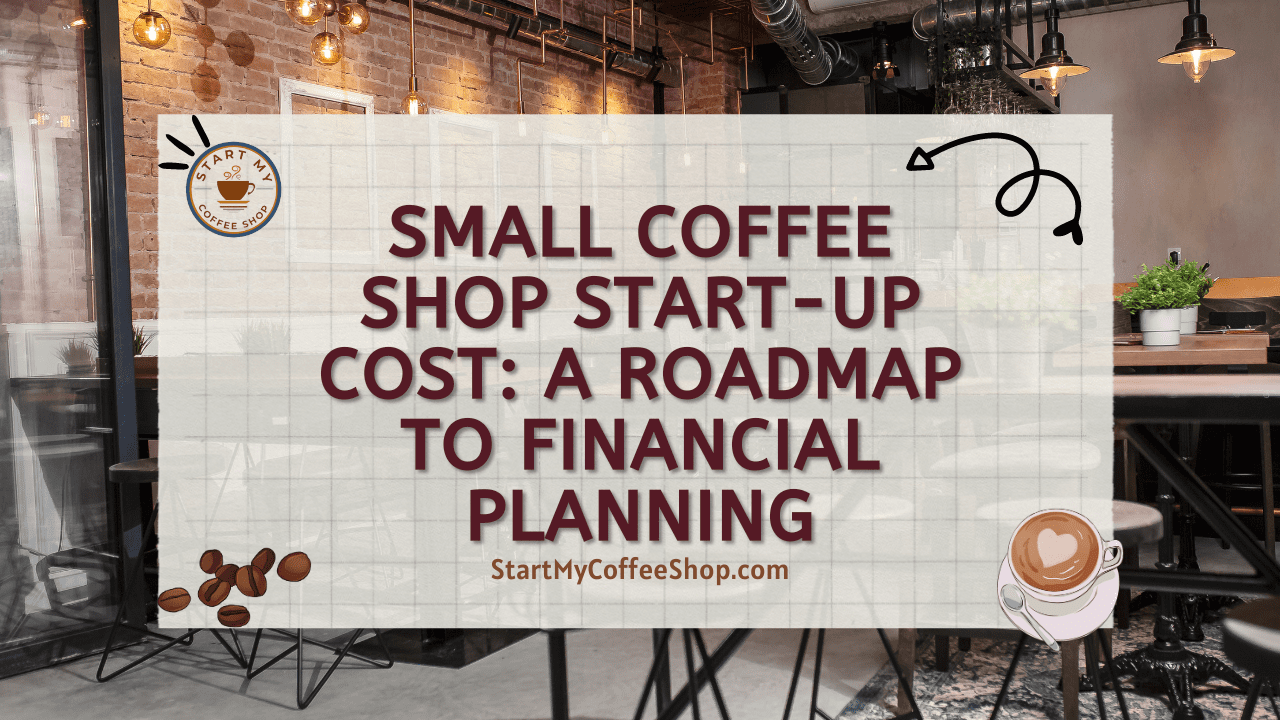Opening a small coffee shop can be an exciting venture for coffee enthusiasts and aspiring entrepreneurs. However, before embarking on this caffeine-fueled journey, it’s crucial to understand the start-up costs involved.
Start-up costs for a small coffee shop can vary, but they generally range from $10,000 to $50,000. Factors such as location, equipment, renovations, permits, supplies, and marketing influence the overall expenses.
In this article, I will delve into the various aspects of small coffee shop start-up costs, including location, equipment, renovations, permits, supplies, and marketing.
1. Location Matters
It’s paramount to carefully evaluate the costs associated with rent or property purchase, as they will have a significant impact on your start-up expenses. When considering the location, take into account several crucial factors.
Firstly, analyze the foot traffic in the area. Look for bustling streets, busy intersections, or popular destinations that attract a consistent flow of potential customers. A high volume of foot traffic increases the likelihood of attracting new customers and achieving a steady stream of sales.
Secondly, consider the proximity of the location to residential areas or offices. Being conveniently situated near residential communities or business districts can capture a regular customer base. People often seek coffee shops for their daily caffeine fixes or as a meeting place, so being easily accessible to these target demographics is advantageous.
Furthermore, assess the level of competition in the vicinity. While having some competition can be healthy, too much nearby may dilute your customer base. Evaluate the uniqueness of your offerings and consider how you can differentiate your coffee shop to stand out from the competition.
It’s important to note that urban areas or trendy neighborhoods typically come with higher rent costs. However, they also offer increased visibility and a higher potential for customer flow. Balancing the cost with the potential benefits of customer attraction and brand exposure is crucial when making the final decision.
Remember, choosing the right location requires a careful analysis of the aforementioned factors. Take the time to conduct thorough research, seek professional advice if needed, and consider the long-term viability and sustainability of your coffee shop in the chosen location.
2. Equipment Essentials
To provide customers with a delightful coffee experience, it is essential to invest in high-quality coffee-making equipment. The core equipment you’ll need for your coffee shop includes an espresso machine, grinders, brewers, refrigeration units, and various utensils. These items are the backbone of your coffee preparation process and directly impact the taste and quality of your beverages.
However, it’s important to tailor your equipment selection to your specific menu and specialty offerings. For example, if you plan to offer blended drinks, such as smoothies or frappes, investing in a reliable blender becomes necessary. Similarly, if you aim to roast your coffee beans, a coffee roaster will be a valuable addition to your equipment arsenal.
When budgeting for your coffee-making equipment, allocate a dedicated portion of your start-up funds. This ensures that you prioritize quality and functionality while still considering your budgetary constraints. Explore options for purchasing or leasing equipment, and compare prices, warranties, and customer reviews to make informed decisions.
Remember, investing in superior coffee-making equipment not only enhances the quality of your beverages but also contributes to the overall perception and reputation of your coffee shop. Customers appreciate a well-crafted cup of coffee, and the right equipment plays a significant role in achieving that.
3. Renovations and Interior Design
Crafting an inviting ambiance is a key element in attracting customers and establishing a distinct brand identity for your coffee shop. Renovations encompass a range of tasks that contribute to the overall aesthetic appeal and atmosphere of your space.
These may include plumbing and electrical work to ensure functionality and safety, flooring selection to create a warm and welcoming environment, painting to set the desired mood or theme, and thoughtful furniture selection for comfort and style.

Assessing the extent of renovations necessary will largely depend on the condition of the property you have chosen for your coffee shop. Consider factors such as existing infrastructure, layout, and any structural modifications required to optimize the space. Allocate a dedicated portion of your budget to cover the costs associated with these renovations.
When planning the renovations, it is essential to align the design elements with your brand identity and target audience. Consider the overall theme, color scheme, and ambiance you wish to create. A cozy and rustic aesthetic may require different materials and finishes compared to a sleek and modern design.
While renovations can be a significant investment, they play a crucial role in shaping the overall customer experience. An inviting and well-designed coffee shop encourages customers to linger, return, and recommend your establishment to others. Prioritize renovations that align with your vision and budget, ensuring that they contribute to creating a memorable and appealing atmosphere for your patrons.
Read more about Cost To Open Coffee Ice Cream Shop: From Investment to Indulgence
4. Permitting and Licenses
To operate your coffee shop legally, it is crucial to comply with local regulations and obtain the necessary permits and licenses. These requirements typically include health permits, food handling permits, liquor licenses (if you plan to serve alcohol), and business licenses. The specific permits and licenses needed can vary depending on your location and the services you offer.
Researching the specific requirements of your locality is essential to ensure that you meet all the necessary legal obligations. Contact the relevant local authorities or visit their websites to gather information about the permits and licenses you need to acquire. Additionally, familiarize yourself with the application process, documentation requirements, and any associated fees.
Allocate a portion of your budget to cover the application fees and any necessary inspections that may be required during the permit or license acquisition process. It is crucial to factor in these costs to ensure that you are compliant with all legal obligations from the start and can operate your coffee shop without any legal complications.
5. Supplies and Inventory
To serve a superior cup of coffee, it is essential to source high-quality beans, milk, syrups, and other ingredients. Start by conducting thorough research to identify reputable suppliers who can provide the desired quality and consistency of these products. Once you have identified potential suppliers, calculate the costs of inventory based on your projected sales volume and menu offerings. Take into consideration factors such as potential wastage, the shelf life of perishable items, and storage requirements. This will help you estimate the necessary quantity of supplies and ingredients needed to meet customer demand while minimizing unnecessary expenses. By carefully selecting suppliers and efficiently managing your inventory, you can ensure a consistent and delightful coffee experience for your customers while optimizing your costs.
6. Marketing and Advertising
Promoting your coffee shop is essential to attract customers and build brand awareness. Allocate a dedicated portion of your start-up budget to implement effective marketing initiatives. Consider a mix of online and offline advertising strategies, such as targeted digital ads, local print publications, and radio spots. Develop a strong online presence through engaging social media campaigns, website development, and search engine optimization. Invest in eye-catching signage and branding materials to create a memorable visual identity for your coffee shop. Collaborate with local influencers or organize community events to generate buzz and connect with potential customers. Remember, a well-executed marketing strategy can significantly contribute to the growth of your coffee shop by effectively reaching your target audience and establishing your brand in the market.
7. Staffing Costs
When planning your coffee shop start-up costs, it’s important to consider the expenses associated with hiring and training your staff. Determine the number of employees needed based on your anticipated workload and the size of your coffee shop. Ensure that you comply with labor laws and regulations regarding wages, benefits, and working conditions. Allocate funds for employee salaries, taking into account factors such as experience and local market rates. Additionally, budget for training programs to equip your staff with the necessary skills and knowledge to deliver excellent customer service. Consider outfitting your employees with uniforms and include any associated overhead costs such as payroll taxes and insurance. By carefully planning and budgeting for your staff-related expenses, you can build a capable and motivated team that contributes to the improvement of your coffee shop.
8. Contingency Fund
When embarking on the start-up journey of your coffee shop, it is wise to allocate a contingency fund specifically designed to cover unexpected expenses or any unforeseen circumstances that may arise along the way. This financial safety net acts as a cushion, providing you with peace of mind and ensuring that you can handle any financial surprises that come your way without jeopardizing the progress and stability of your coffee shop.
Unforeseen expenses can crop up at any time during the start-up phase. It could be unexpected repairs or maintenance costs for equipment, sudden regulatory changes that require adjustments or additional permits, or even unexpected market fluctuations that affect your initial projections. By setting aside a contingency fund, you create a financial buffer to address these unforeseen challenges effectively.

The amount you allocate for the contingency fund will depend on various factors, such as the scale of your coffee shop, the complexity of operations, and your risk tolerance. It is recommended to set aside a percentage of your overall start-up budget, typically ranging from 10% to 20%. This ensures that you have a sufficient safety net to handle unexpected situations without causing significant financial strain.
Having a contingency fund in place not only allows you to address unexpected expenses but also provides you with flexibility and adaptability. It gives you the freedom to respond to unforeseen circumstances promptly, enabling you to make informed decisions without compromising the quality of your offerings or the overall experience for your customers.
Remember, setting aside a contingency fund is a proactive measure that demonstrates prudent financial planning. It reflects your commitment to mitigating risks and preparing for the uncertainties that may arise during the start-up phase. By being prepared and having a financial buffer in place, you can navigate the challenges with confidence, ensuring the long-term growth and sustainability of your coffee shop venture.
Read more about Cost to Startup a Coffee Shop: Unveiling the Startup Costs
Summary
Understanding the start-up costs involved in opening a small coffee shop is crucial for aspiring entrepreneurs. By carefully budgeting and planning for expenses related to location, equipment, renovations, permits, supplies, marketing, staffing, and a contingency fund, you can set yourself up for progress.
Frequently Asked Questions

Q: How important is the location when considering start-up costs for a coffee shop?
A: High-traffic areas or trendy neighborhoods may have higher rent costs, but they can provide better opportunities for attracting customers and generating sales.
Q: What equipment do I need to budget for when opening a small coffee shop?
A: Essential equipment for a coffee shop includes an espresso machine, grinders, brewers, refrigeration units, and various utensils.
Q: Are there any permits or licenses I need to obtain, and how much do they cost?
A: Yes. These may include health permits, food handling permits, liquor licenses (if applicable), and business licenses. The costs vary depending on your location and the specific requirements set by local authorities.
To learn more on how to start your own coffee shop checkout my startup documents here
Please note: This blog post is for educational purposes only and does not constitute legal advice. Please consult a legal expert to address your specific needs.

Hi! I’m Shawn Chun
My adventure in coffee began when I first launched my first coffee shop back in the early 2000s. I had to figure out so many things on my own and to make it worse within 2 years of opening two large corporate coffee chains moved in just blocks away from me!
As I saw smaller and even some larger coffee shops in the neighborhood slowly lose customers to these giant coffee chains and slowly close up shop, I knew that I had to start getting creative…or go out of business.
I (like you may be) knew the coffee industry well. I could make the best latte art around and the foam on my caps was the fluffiest you have ever seen. I even had the best state-of-the-art 2 group digital Nuova Simonelli machine money could buy. But I knew that these things alone would not be enough to lure customers away from the name brand established coffee shops.
Eventually, through lots of trial and error as well as perseverance and creativity I did find a way to not only survive but also thrive in the coffee/espresso industry even while those corporate coffee chains stayed put. During those years I learned to adapt and always faced new challenges. It was not always easy, however, in the end, I was the sole survivor independent coffee shop within a 10-mile radius of my location. Just two corporate coffee chains and I were left after that year. All told the corporate coffee chains took down over 15 small independent coffee shops and kiosks and I was the last one standing and thriving.
Along the years I meet others with the same passion for coffee and I quickly learned that it is not only “how good a barista is” that makes a coffee shop successful, but the business side of coffee as well.
Hence why I started this website you are on now. To provide the tools and resources for up and coming coffee shop owners to gain that vital insight and knowledge on how to start a coffee shop successfully.
Stick around, browse through my helpful blog and resources and enjoy your stay! With lots of LATTE LOVE!
Shawn







